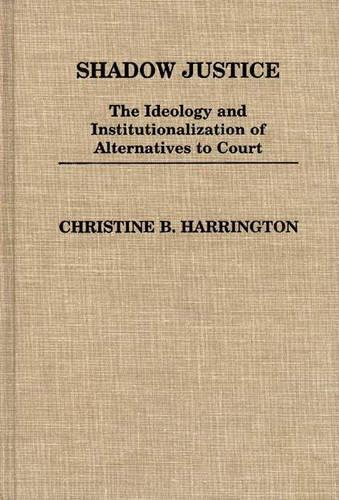
Shadow Justice: The Ideology and Institutionalization of Alternatives to Court
(Hardback)
Publishing Details
Shadow Justice: The Ideology and Institutionalization of Alternatives to Court
By (Author) Christin Harrington
Bloomsbury Publishing PLC
Praeger Publishers Inc
19th November 1985
United States
Classifications
Tertiary Education
Non Fiction
Methods, theory and philosophy of law
340.1
Physical Properties
Hardback
230
Width 140mm, Height 216mm
454g
Description
This first critical examination of informal dispute processing links the institutionalization of alternatives to the court process and the ideology of informalism with the evolution of the American court system. The author connects dispute processing reform to the broader social and political context in which it developed, including the rise of judicial management in the Progressive period and the reconstruction of court unification in the 1970s. Harrington defines legal resources and their distribution in alternative dispute resolution policy before focusing on the institutionalization of this reform in a case study of a federally sponsored Neighborhood Justice Center. In conclusion, Harrington finds that the symbols of informalism and its institutions are a mere shadow of conventional legal practices.
Reviews
Harrington's thesis is that dispute resolution is a political resource. From this point of view she explores the philosophy of order maintenance practices of dispute processing. The author looks at the types of disputes that are at the fringes of the American legal system, how they are dealt with, and which social interests are served by this process. The first part of the book examines courts and the idology of informalism, and a second segment looks at judicial management and delegalization. The final part is a case study of a neighborhood justice center established as a pilot project by the US Justice Department.... Useful bibliography. Recommended for students of law, criminology, and legal anthropology...-Choice
"Harrington's thesis is that dispute resolution is a political resource. From this point of view she explores the philosophy of order maintenance practices of dispute processing. The author looks at the types of disputes that are at the fringes of the American legal system, how they are dealt with, and which social interests are served by this process. The first part of the book examines courts and the idology of informalism, and a second segment looks at judicial management and delegalization. The final part is a case study of a neighborhood justice center established as a pilot project by the US Justice Department.... Useful bibliography. Recommended for students of law, criminology, and legal anthropology..."-Choice
Author Bio
rrington /f Christine /i B.
